From Lek Pervizi
Memorie.al / Who would have thought that the day would come for me to write about Lemi, while there were other people of that level, co-sufferers and colleagues, who could present his figure, as a person, as an intellectual, as a writer, as a translator, as a professor and how do they imprison and exile them, with a life sentence?! I, who could be called a student of his, had the opportunity to know him and live with him in different camps, at a very young age, where the dictatorship had plagued us, with no hope of salvation! In fact, I was prepared to meet him, because my brother, Valentini, who had spent two years with him in Shkodra prison, had spoken to me. Lemi and his friends were convicted in a court session, where the animal cruelty of the infamous prosecutor Arani Çela was prominent. The pretense was so terrifying that they were waiting for a decision to shoot six people as usual, among them Guljelm Deda, the Kosovar teacher Zef Agimi, Mark Temali, Nush Doda and two others.
To everyone’s surprise, they escaped with apparently light punishments, but which then lasted a lifetime of ours. It was the only session that did not have death sentences, of those sessions that had led to the shooting, with hundreds of intellectuals and patriots from Shkodra. Aranit Çela, the real executioner, took part personally and with his own hand in the executions! Time passed, Lemi spent five years in prison and labor camps, from which he came out alive, luckily! When he came, the “hand of the Party” caught him again with its claws and dragged him to the Shtyllas camp, along with many Shkodra residents and other compatriots, guilty only of casting shadows on the ground! For the most part, prominent intellectuals, former ministers, directors, major officers, personalities, professors, philosophers, prominent clergy, writers, painters, musicians, engineers, lawyers, agronomists, students, others, with some doctorates and more several languages to be mastered.
Between you and the sons of important fugitives. Valentini and I got involved in this wave, and ended up there, along with other sons of fathers. That’s how I met Lemi and we immediately became friends, despite the age difference. We were approached by the light of life and the fiery torch of Prometheus, the immortal hero of all those who suffer from being stuck in the shackles of human tyranny, whose most ghastly incarnation was in the communist dictatorship, which was wreaking havoc on the Albanian people. That was exterminating the highest intellectual and patriotic layer of the nation’s homeland! Guljelm Deda was definitely a worthy representative of this elite layer.
We spent four years in the Kuci camp, nothing like a numerical amount, but which never passed. There, in the same room, we stuck together. Let’s go to the eastern corner, and so on, Valentini, Fatbardh Kupi, me at the door. In front of us, from the western corner, Nikoll Paluca, Pjetër Bardheci, Zef Shiroka, Tomorr Dine, Ibrahim Sokoli and Thabit Rusi. Our room became the center of the entire camp, and it was filled during the day until the evening, full and full of people, with tobacco smoke, with chatter and speeches, with dissertations and reports, with readings and recitations, with songs and musical sounds, with shouts. I screamed. The command had left us free to roam around the rooms, but surprisingly, everyone gathered only in our room, which took the name of an academic auditorium. When the debates began, they were conducted with loud voices and fiery passion, the envy of the great orators, Demosthenes and Cicero of antiquity. Ali Erebara read to us every night, a book with the history of kings, which he had translated from Croatian (he knew 12 languages!).
Lemi raised the issue at the academy level, with 50 or so intellectuals who were gathered there with grains. The families who came to the meeting had brought books of their choice. All French and English literature was browsed more than once, with contours from Italian and German culture. Young people learned as much as they could: French, English, German, Italian, Myqerem Bey Janina decided to learn Turkish. There were others who mastered European languages, such as German, English, French, Italian, Slavic languages, Romanian, Greek, etc. etc. Their names show: Mikel Koliqi, Ali Ererbara, Mitat Araniti, Lazër Radi, Ali Cungu, Sander Saraçi, Zef Shiroka, Ibrahim Sokoli, Mark Temali, Baldasar e Zef Benusi, Nedim Kokona, etc. etc.
Go ahead and say that Kuçi did not go from prison to university or academy. What a laugh! Someone proposed to hold diplomas as well. It was my fault that I didn’t pay attention to them and didn’t draw them. It would have been a unique job! And lo, a book came to Lem. His brother, Pashko, brought it to him. It was the epic poem “Orlando Furioso”, by Ludovik Ariosto, 40 thousand verses in two thousand rhyming octaves, a masterpiece of Italian and world literature. It had to be translated, because no one had taken on that heavy burden. Pashko Gjeçi, Henrik Lacaj and Mark Dema had recommended Lem. There, in that semi-dark corner, on a notebook of ink pens, began to be arranged in Albanian, the verses of Ariosto’s classical poetry, whose octaves were defined as “golden”, for their beauty and perfection. Our Lem was arranging them just as beautifully and just as perfectly, in the language of Gjergj Fishta.
From the beginning, it was seen that the work he had started, without any prospect of profit, was only as a dedication and an opportunity to set in motion the brain and skills that the dictatorship wanted to extinguish. Whether he was playing dominoes, spathi or even “bridge”, chess, cicmic, etc., he would rather read me or take turns with eleven-syllable verses, with rhymes. Lem’s creativity, like that of many others, was blocked since November 1944. A historical poem “Vision” that he had started in the prison of Shkodra, under the momentum of an unrestrained inspiration, remained crippled in only five sounds, a total of 60 verses of eleven syllables. Even the last three lines, waited with great patience, for 46 years, to be finally lined up, by a hand that was already trembling. The tortures and torments had exhausted that living body, and tied it up! The dictatorship was pleased when it received such ghana.
But let’s go back to the top of Kuchi, where the flame of knowledge was kindled. We were in heather country. I decided to carve a chibouk, bind Prometheus, that hero who inspired us and in whom we felt ourselves embodied. I had fashioned a knife from a piece of German helmet back in the Tepelena camp. They perfect steel! With that I got to work. In fact, I had carvings for the pleasure of smoking friends, chibukas with playing heads, old men, satyrs, dolphins, etc. That’s how I managed to carve Prometheus, chained him behind the rock, from where tobacco smoke was coming out, as if from a volcano. While the Albanian had stuck her claws in her, she was biting her liver. I gave it to Lem. Engravings and others for close friends of suffering. Lem was inspired and wrote a poem to the çibuk – Promete. But it didn’t stop there.
In the meantime, I had carved a small sculpture, yes in heather wood, a hand-to-hand fight, of a “dragon or kreshnik”, with a “kulcheder” monster, which was related to popular legends and at the same time to our condition, with unrestrained resistance against communism’s obedient dictatorship, which was embodied in the devouring cult. Even to this “work of art”, Lemi did not stop without weaving a few lines, which fortunately have survived in my memory. This poem was written in the Gradishta camp, 1958-1959.
I had a good command of Italian, because I had studied it at a literary level, and for Albanian I was inclined to overcome the rigid rules of accents, which I called useless, because they forced the reader to make harsh nasal and facial sounds. Especially for the literary genre. Debates were created for these linguistic problems, and I had to defend my thesis, which Lemi supported. This idea did not come to me in vain. I had the opportunity to listen to the opinions of several professors of literature and the Albanian language, such as; Pashko Gjeçi, Henrik Lacaj, Mark Dema, Viktor Volaj. The one whom Lemi trusted laughed first, reading the translation, and he liked my remarks. The translation of the first two cantos was of a high literary level. But there at the top of Kuç, Lemi suspended the work temporarily, because it was seen that they would remove us from there, to the Lushnje farm, where a new sector had been created, the Gradishta internment camp, in the middle of the marsh, where our families had been taken .
This description can be called unnecessary for a preface, while it seems to me necessary to enter into that friendship that was born and strengthened in difficult conditions of punishment, but on the other hand and from a mental and spiritual match, as far as it belongs to culture, art and literature. My brother Valentini, 10 years before me, was almost the same age as Lemi, he had a close friendship with him, but in literary and artistic matters, I was closer and in a better understanding. Therefore, after so many years, when Lemi came to Italy, he trusted me with all his works, and that’s why I decided to present them to the Albanian readers, although so simple, but with a very deep meaning. This content, therefore, emerges precisely from those letters, from those lines arranged with a hand that trembled and did not obey him, so much so that he was forced to dictate to his faithful and determined wife, Marie Muzhani, the daughter of the well-known professor from Shkodran, Luigj Muzhani.
These few letters are the last written testament of Guljelm Deda, and at the same time an overview of his thought and his troubled soul, due to the inability to express his creative talent in worthy literary works, with a high artistic level. Therefore, among the letters, I have included some of his poetic creations, as well as the beautiful commentary dedicated to the gem of popular epic poetry, the Kreshnik song of “Gjergj Elez Ali”, and in closing, the introduction to the study of Bogdan’s language in the work “Cuneus Prophetarum” – ‘Ceta e Profetevë’, translated by me into Albanian, from the Italian text that Lemi had drawn up to defend the laura for literature – philosophy.
In order to complete and better this summary of creativity and translations, I will also present some translations that he skillfully made, from the Albanian language to the Italian language, as well as some parts of the translations into the Albanian language. I saw it as reasonable, because through them, his elevated figure as a man of culture, as a writer, as a real poet, and as a linguist is highlighted.Shkodra has someone to boast of. It has continuously and in all ages produced sons worthy to represent and exalt it, whether heroes and statesmen, as well as people of knowledge and culture, people who are determined and protected with pure Albanianism. From Buzuku, Budi, Bogdani, Barleti, to Fishta, Mjeda, Gurakuqi, Koliqi, Camaj, Migjeni, others, to be affirmed historically, and to those who still remain heroes and scholars to be silent, because they were crushed in the grave of monstrous that the wild and barbaric communist dictatorship had eroded with the barrels of murderous weapons, which implemented the foreign and hostile policy of Slavism, to eradicate Albanianism, which took its inspiration and strength precisely from the patriotic intellectual layers.
And in Shkodër, there was havoc! The ghastly shingle of Cyrus was filled with blood and graves. With common pits, the remains of the victims are not being found even to this day. Shkodra itself was filled with prisons. The special trials, under the direction of Josif Pashkove, Arani Çelave, and by order of the “Party”, took the elected sons of Shkodra to firing squads and to prisons, extermination camps and exile, for half a century! That’s how the talents and men who had just started to assert themselves, like; Ndre Zadeja, Vinçenc Prenushi, Gjon Shllaku, who were eliminated more easily than a blade of grass. Perhaps Guljelm Deda and his friends could suffer their fate, but it was not written that way. A long path of suffering awaited them, an indescribable Calvary of suffering, to destroy them spiritually, morally and mentally.
But those who survived and were able to leave their indelible mark in the history of Albanian culture. Because it is those sons of Shkodra who became masters of the elevation of world literature. And this was a merit, but a merit that required literary talent and linguistic competence. The names of Pashko Gjeçi, Henrik Lacajt, Gjon Shllakut, Guljelm Dedas, Mark Demës, Injac Zamputit, etc., are written in golden letters in the book of honor of the city of Shkodra. Their names are related to the names of the colossus of world culture, such as; Homer, Virgil, Lucretius, Horace, Ovid, Dante, Ariosto, Tasso, etc., which they translated and gave to Albanian readers
In the Ploc sector of Lushnje, the real work of translation began, where Mark Dema came to meet with Lemi, who brought him a good edition of “Orlando Furioso”, with thoughts, instructions and courage. Mark Dema highly valued Lem, and encouraged him to persevere with the translation that appeared from the beginning, of a high literary level. Lemi worked in a construction brigade, when we were interned. Co-workers made it easy for Lem, not allowing him to do odd jobs. In this way, he had time and strength to play the pencil over the rhymes of Ariosto’s verses. In 1962, he married Marie Muzhanin, the daughter of Prof. Luigj Muzhani. On this occasion, the Interior Branch transferred him to Savër, where he was assigned a room in the barracks for internees.
Marie’s family came to their rescue and Lemi worked hard on the translation. A release was made at this time, in 1964, and Lemi took advantage. The issue of translation had reached the highest levels of the state, mainly the Ministry of the Interior. There was an instruction for the translation of all masterpieces of world literature, which started with the translation of Dante’s “Divine Comedy” by Pashko Gjeçi. But the politics of the dictatorship was taking a dark and ghastly turn for the country. The connection with China brought another disaster in Albania, which with the infamous “Cultural Revolution” was subjected to a series of repressive measures and the intensification of the “class war”, which also included culture. Works of European culture were banned, as bourgeois, religious, imperialist, other derogatory adjectives.
“Orlandi makes them crazy”, we have now translated it completely, remained in the drawers of the Muzhan family, where Lemi lived. But the watchful eye of “Nana Parti” discovered Lem again and took him to exile in a lost cooperative of Myzeqe, in the village of Ndrnenas, where he stayed for 24 years, writing verses in the corn and cotton plots, with pickaxe, shovel and duer! This is how the regime valued people of knowledge and culture! Even this tragedy, Lemi managed to survive. But when I met him after 20 years in Tirana, in the summer of 1989, I noticed the random consequences of a lifetime of suffering and torture of all kinds, which had damaged his health, so much so that his hands trembled, creating by writing poetry. and other written works, but now he could no longer possess them, to obey the thread of thought and inspiration, which he had never lacked nor lacked.
But he lacked bodily strength! This was also the diabolical goal of the totalitarian regime of the communist dictatorship. The annihilation of values and people who represented the true national culture! Not by chance, the ashes of Gjergj Fishta, Ndre Zadeja, Gjon Shllak, etc., were removed from the graves and thrown into the river or lake. Their works were strictly prohibited. But somewhere there, among the tall mountains, the Homeric songs of the “Lute of Malcsia” played and echoed, which the people had engraved in their minds and memories, never to be forgotten. Whereas Lemi and his friends were destined to melt and waste away, down to the last cell of their physical and mental composition, in order not to allow them to create such immortal works!
The destinies of the peoples enslaved under communism suddenly changed. The wall of shame and dividing the world into two opposing camps collapsed, and with it the Bolshevik Stalinist dictatorships of Eastern Europe collapsed. That collapse was also happening in Albania, although with dubious proportions. Lemi found the opportunity and was able to cross the Adriatic Sea, which separated him from Europe for half a century, to seek salvation and healing in the world of Western civilization, precisely in Italy, where he had finished his studies and where culture had always been in the foreground. The reception in Italy was shocking, even denying! No one cared about the sufferings of these heroes and martyrs of the 20th century, who had remained invincible to half a century of bloody tyranny. They barely gave him refugee status and residence permit, without any other help.
Thanks to several religious centers, nuns and priests, Lemi and Maria were able to find help and temporary shelter in Trieste, and then permanent in Perugia. In his letters, this apathetic and disdainful attitude stands out towards a man who, if he suffered, suffered for the highest principles of human society, for the great ideals of freedom and democracy. Let’s leave with my friends, I suffer the denial and violation of all human rights, even the most elementary, in the name of the abstract expression “Man is the most precious capital…”, which Lenin and Stalin created on paper and which they themselves implemented and their followers in practice, you turned this man into a work tool, that as such could share in the “precious” capital!
Even our Lem was part of this “precious” capital. For the “precious” dictatorship, as a slave. For society, “prized” as an intellectual. For the Western world, “precious” as a refugee, mold. For the culture “prized” as a talent. For the Nation, “precious” as a living hero and martyr. For history, “prized” as a victim, among thousands of victims. But Lemi was not a victim at all, and therefore we give him the place he deserves, the one among the elite of the human and cultural culture of the Albanian nation.
Man and intellectual, in Guljelm Deda, are a double composition that cannot be separated, although with opposite distinguishing points. Those who know Lem, both before prisons, during prisons and after his release, come to this conclusion. An energetic Lem full of life, strong body and few words. When society wanted him, an unrestrained Lem appeared, laughing and full of humor, even in the most difficult conditions. His Homeric gas, aroused enthusiasm and involved all those around him. But when the work required him, he knew how to use selected and refined words, to embroider speeches and reports as the best orator of the academic auditoriums. He gave competent judgments on literary – artistic, linguistic and philosophical problems, etc. It was not at all practical for side jobs, where it did not tell him at all! But for mental affairs, it was not thanks to anyone!
Everything I have listed so far emerges by itself from a careful reading of these few letters and writings that he left us. Don’t forget that these few writings are of a completely personal nature, like letters to friends and family, or to any cultural personality. Letters that contain a lot of ideas, expressed in a few lines, but with deep meanings. But let’s not forget, as we said, that Guljelm Deda left us a great work, the perfect translation of the masterpiece of Italian and world literature, “Orlando i Çmendun”, by Ludovik Ariosto. Translation of the highest literary, linguistic and poetic level, the famous author himself envied. Not even the Germans have managed to translate it, let alone other peoples, like; Russian, Polish, Romanian, etc. Other countries have translated it into prose.
The translation of this poem requires being a poet yourself, a master of the mother tongue and the language of the author. These properties and qualities, Lemi had all of them, added the desire to write and create that he could not realize, because they shortened his hands and head. Therefore, his translation should also be considered as a work, on which he worked as if he were the creative writer himself, the dictatorship had given him so much freedom of expression that it closed and prohibited any other expression of the independent. In this context, his work should be considered from the literary and linguistic point of view, and how they serve Albanian literature and linguistics. It is quite understandable that his work will have an impact, especially in the treatment of the literary genre, where he is a master and competent. Master in terms of the artistic side of handling the Italian poetic text, given in Albanian, through expressions, locutions, comparisons, aphorisms, etc.
In finding the rhyme, which makes Ariosto one of the most difficult poets to translate, because his octave consists of six lines with alternate rhyme and the last two lines, with kiss rhyme, according to the scheme, AB, AB , AB, CC. Let’s not forget that the eleven-syllable verse, a classical verse, is one of the most difficult to deal with. These difficulties did not affect Guljelm Deda at all, because he was rich in vocabulary and Albanian linguistic details, as well as a master in the use and handling of metrics, because he was a real poet himself. The glorious work of Lem, as well as of his translation colleagues that we have mentioned, raise the Albanian language to the level of the most capable and richest languages, in terms of the translation and interpretation of other European languages, or of other countries, therefore as a complete and elaborate language.
Before this show of high literary proportions, where the Albanian language has shown such qualities and adaptability, to overcome the limited possibilities of the negative worldviews that the world has and has nurtured towards the Albanian culture, this culture rises as a bright monument and magnificent, not because we gave the world our remaining masterpieces, untranslated into foreign languages, but because we were able to adopt the world’s masterpieces, in our Albanian language, as a natural process of this language, which translates the masterpieces as masterpiece, and not as formal and artificial treatments, without soul and artistic feeling and, for the knowledge of the reader, as it has happened in some cases.
At the end of this rather long preface, we can say that Guljelm Deda remains, both with the few poems he left behind, as well as with some scholarly writings, but especially with his major translation, “Orlandi goes crazy”, a man with rare qualities, that although violence, terror and punishments wanted to destroy and annihilate him, he had that courage and that spiritual and mental power, in the example of Prometheus, to survive and face the storm of dictatorship, without fearing his eyes . He lit up and kept burning that flame of Prometheus, to light his way and the way of Albanian culture, with dignity and pride. In front of such figures, who at the same time embody the culture and heroism of the Albanian people and nation, we must bow down with respect and honor, because they carry the entire Albanian spiritual and mental world, which stood unyielding for centuries and knew how to withstand the years sad and ghastly, of the most savage dictatorship known to history.
Lemi is one of those heroic representatives of the Albanian culture, a Shkodran, who was born and grew up, where he stayed, the fire of freedom and culture always burned through the centuries, and will continue to do so in the coming centuries. A proud son of these lands, worthy to stand on the pedestal of honor, alongside many other bright figures of the Albanian national culture: “Honor of Shkodra, honor of Albania”! Memorie.al




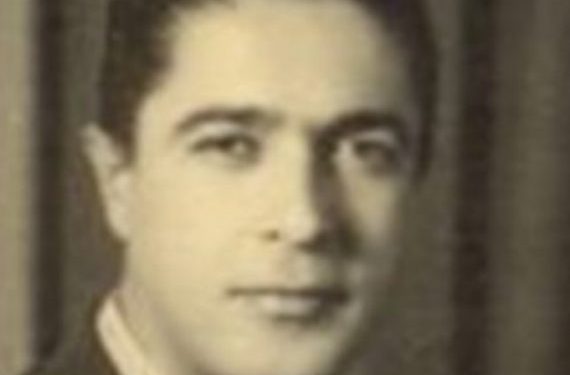
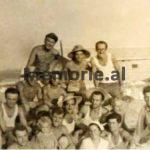
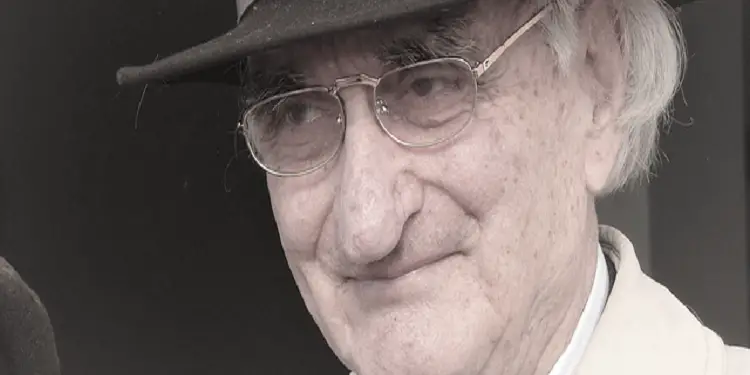
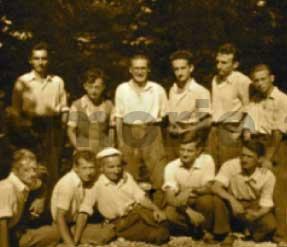
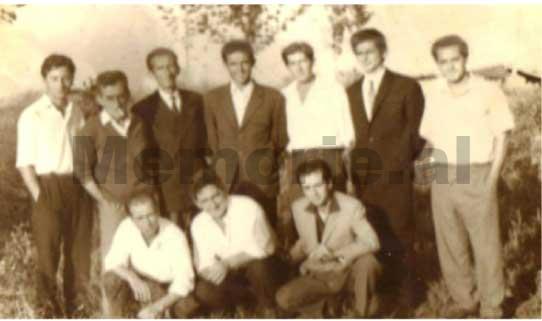
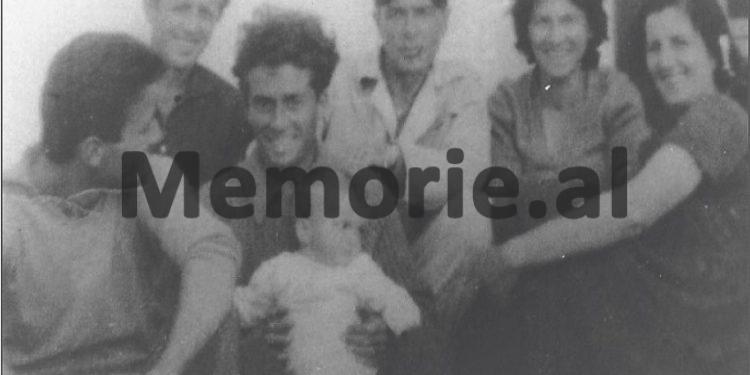
![“In an attempt to rescue one another, 10 workers were poisoned, but besides the brigadier, [another] 6 also died…”/ The secret document of June 11, 1979, is revealed, regarding the deaths of 6 employees at the Metallurgy Plant.](https://memorie.al/wp-content/uploads/2026/02/maxresdefault-350x250.jpg)





